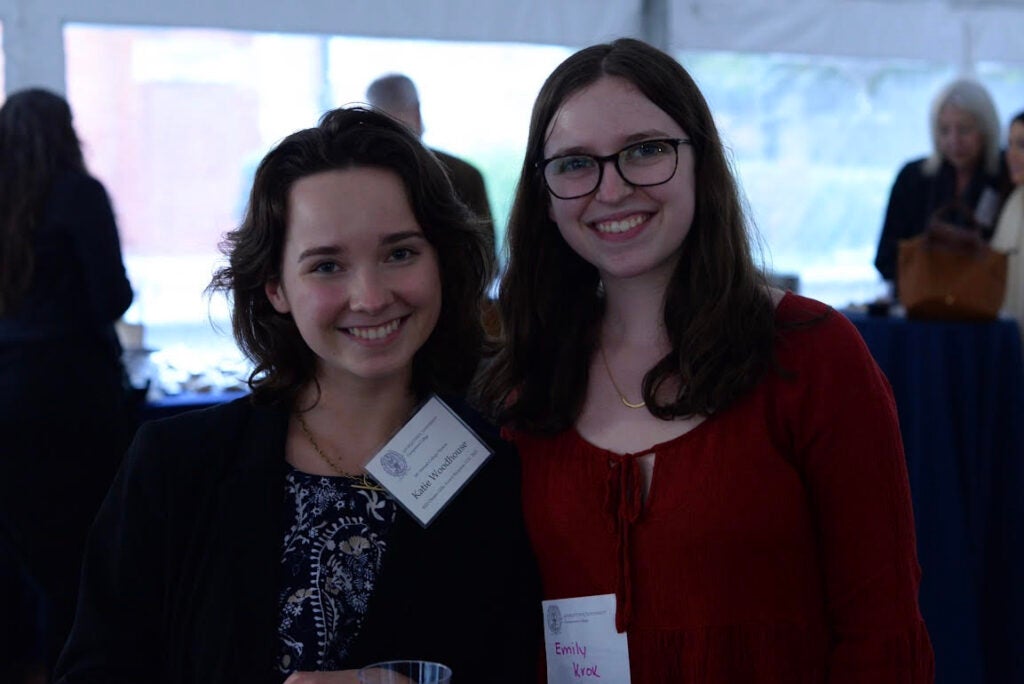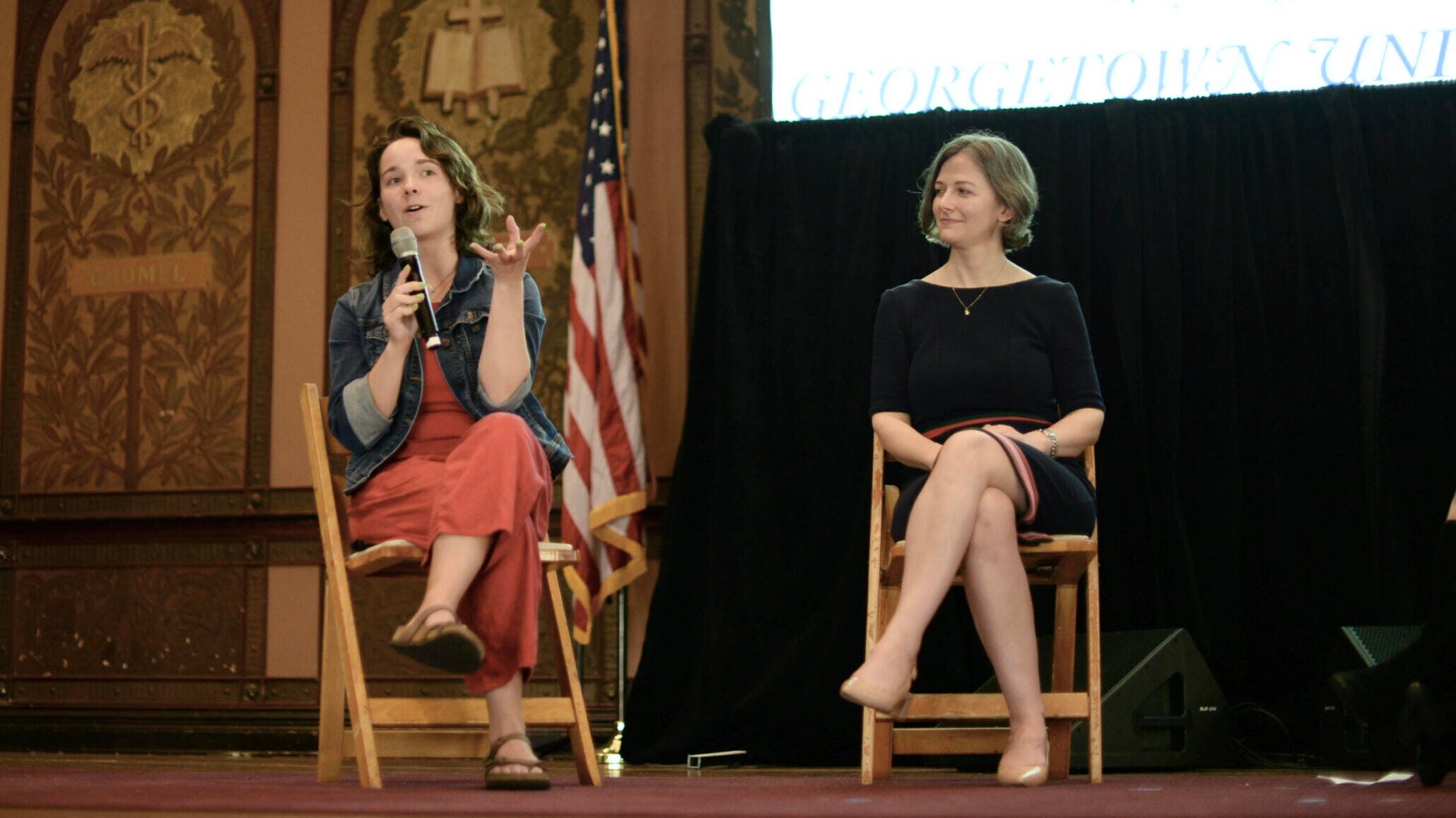College Academic Council Recognizes Scholastic Tenacity and Independent Thought
The College Academic Council celebrated distinguished faculty and promising students at its 16th annual awards ceremony. Each year, the CAC asks students in the College to nominate faculty members who have shaped their experience in a meaningful way. This year’s event honored Erin Cline, a professor of Chinese philosophy whose work in the classroom has transformed her students’ lives.
“Instead of carving off our edges to fit a cookie-cutter pedagogy, she meets each student as already having their own situated knowledge and wealth of experience,” shares Lin Henke (C’23), who took Cline’s Ignatius Seminar as a first year. “As the Daoists might say, she meets us each as a piece of unhewn wood, rather than putting us on a carving block that academia can sometimes become.”
Cline’s students cite personal and academic transformations thanks to their coursework with the philosopher.
“When you ask students to describe Professor Cline, they use words like inspiring, intelligent, genuine and someone who fosters true collaboration, community and closeness,” Dean Rosario Ceballo says.
In the spring of 2021, a group of College seniors who had taken her course Human Flourishing: East and West as freshmen asked if they could revisit the course in their final year. Cline obliged, creating a first-of-its-kind Ignatius Seminar for seniors, which brought together the original group of students to leverage their cumulative college experience for shared learning and reflection.
For Katie Ho (C’22), who took Chinese Philosophy with Cline in her first semester as a student, the experience has informed the remainder of her time at Georgetown.
“Even though we were all little boxes on screens, I could feel her warm, compassionate, intelligent and strong presence radiating outwards from her little box as soon as she turned her camera on, smiled, and asked how we were doing that day,” Ho reflects. “She is, without a doubt, one of the most special individuals I have ever had the privilege of learning from, and I am beyond grateful to have taken four courses with her during my time here at Georgetown.
Cline is the Tagliabue Distinguished Professor in Interfaith Studies and Dialogue and a Senior Research Fellow in the Berkley Center for Religion, Peace and World Affairs. She is the author of five books. Her two most recent books are Little Sprouts and the Dao of Parenting and The Analects: A Guide, which were published in 2020 and 2021.
Students Lauded for Interdisciplinary Paths
Also recognized by the CAC were Katie Woodhouse (C’22) and Arjun Ravi (C’22), the recipients of the 2022 Chester Gillis Award. Established in 2016 by the College Academic Council (CAC), the award recognizes students who embody the values of a liberal arts education in the Jesuit tradition, which Gillis championed during his time as Dean.
“The award carries on Dean Gillis’s legacy by recognizing students whose work engages with Jesuit values in innovative and constructive ways,” says Lucy Doyle (C’22), president of the CAC. “Arjun and Katie have cultivated diverse intellectual commitments that span different departments and disciplines. Both embody the interdisciplinary approach esteemed by the awards.”
Woodhouse, a psychology major and music history minor, has pursued a pre-med pathway through her undergraduate studies. Bringing together these disparate disciplines has enabled Woodhouse to fully explore her academic interests and internal motivations.

Woodhouse and Emily Krok (C’22) at the awards event.
Instead of directly matriculating to medical school, Woodhouse plans to put a capstone on her Jesuit education through a year of service. After graduating in the spring, she will join the Jesuit Volunteer Corps Northwest in Missoula, Montana, where Woodhouse will work as a Child Nutrition and Health Community Advocate at the Missoula Food Bank and Community Center.
“The robust and manifold education I have received from Georgetown College is integral to my future goals in the medical field,” Woodhouse says. “I plan to practice integrative medicine, relying on cultural, social and individual status, varied therapies and a symbiotic doctor-patient relationship rather than conventional primary care.”
At every step of the way, a varied and diverse spate of study defined Woodhouse’s academic career. To fulfill her language requirement, Woodhouse pursued a unique path taking courses in American Sign Language, which led her to classes at Gallaudet University through the College Consortium of Washington, DC.
“Social science, natural science, the humanities, language, the performing arts – they all play a critical role in my undergraduate education,” Woodhouse reflects. “I want to carry that interdisciplinary approach forward. I want to treat and understand patients with the dual skills of a trained psychologist and medical expert, delivering care led by empathy, respect and the pursuit of a greater good.”
Tech Reform, Justice in Policing
Ravi’s time at Georgetown has led him to examine the myriad ways in which evolving technology shapes and changes people’s lives through policing, criminal justice and law enforcement.
“Over the last decade, we have witnessed a boom in automated decision-making to circumvent human bias,” Ravi posits. “Algorithms, however, are not necessarily better than humans: they inherit bias from training data and model-building. And, despite their faults, they are making life-changing decisions on everything from healthcare, hiring and education to housing, credit and welfare.”
To obtain a firsthand perspective on policing, Ravi interned with the Metropolitan Police Department, where he investigated police officer applicants, interviewed residents and reviewed body camera footage. Ravi even accompanied officers in their squad cars during nightly patrols as part of the Summer Crime Initiative – the MPD’s push to combat rising crime in the 6th and 7th police districts.
“I visited the sites of robberies, shootings and domestic violence calls, and I learned about policing in our community,” says Ravi. “Today, some of those police officers are dear friends and mentors, but the system of policing I saw was broken.”
In his own life, Ravi has confronted racial bias firsthand, and is cognizant of the ways seemingly impartial technologies could further entrench racial disparities. By taking on a wide array of courses in economics and mathematics, and pursuing undergraduate research opportunities, Ravi combined the academic with the personal. He studied algorithmic risk assessment in the criminal justice system with Megan Stevenson, an economist and criminal justice researcher at the University of Virginia School of Law, and congressional elections as the Fritz Fellow in Tech & Society at the McCourt School of Public Policy.
“At Georgetown, I have dedicated my course of study to empirically analyzing technology that affects people’s lives,” Ravi says. “Next year, I will be an Empirical Research Fellow at Stanford Law School, working on the economics of crime and fairness in machine learning. With these academic experiences, I hope to translate research into actual policy, fighting for better tech policy at every level.”
